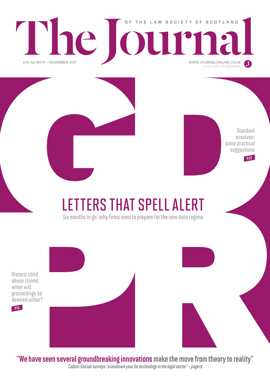Claims outside the rules

Under article 8 of the European Convention on Human Rights (ECHR), everyone has the right to respect for their private and family life. However, this is not an absolute right, but rather a qualified one subject to various tests, including proportionality. In the recent case of Suri v Secretary of State for the Home Department [2017] CSIH 48, the Inner House considered the article 8 right of an Indian national (V) in an immigration context.
Background
V reclaimed against the Lord Ordinary’s refusal of his petition for judicial review of a decision of the Home Secretary (S), certifying his human rights claim as clearly unfounded in terms of s 94(2) of the Nationality, Immigration and Asylum Act 2002.
V had arrived in the UK in August 2009 on a six-month visitor visa. He overstayed and was detained in March 2014. Representations were lodged on V’s behalf based on article 8, in that he was engaged to a British national (B); they had been in a relationship since May 2012; they intended to marry in the near future; and it would be disproportionate to remove V as B had lived in the UK her entire life, could not speak Hindi or Punjabi and had no ties with India. S concluded that V had not demonstrated he was in a “genuine and subsisting relationship” with B, and even if he was, his removal would not breach his article 8 rights.
The Lord Ordinary held that the court’s role was one of review, and albeit S had not given any separate consideration to V’s claim outwith the Immigration Rules, she was not required to do so as there were no additional factors not already taken into account in her assessment under the rules. S’s decision was lacking a clear and explicit statement that she had reached the conclusion that there was no requirement to go outwith the rules given the factors relied on in V’s claim, and this omission amounted to an error of law, but it was not material because such a statement would have made no difference.
Decision
Allowing the reclaiming motion, the court held that as a matter of principle, there was no reason for a decision maker, in approaching the article 8 assessment, to be limited to factors not already taken into account in the assessment under the rules. It would be an error of law to exclude other matters from a consideration of the human rights claim; whether there were insurmountable obstacles to family life with the partner continuing outside the UK was not the same question as arose on a consideration of an article 8 claim outwith the rules.
The Lord Ordinary had therefore fallen into error in his assessment of the factors relied on by V in support of his article 8 claim. It was wrong to exclude material which had been considered in the context of the differently focused assessment under the rules. Therefore, he had erred in his consideration of whether S ought to have assessed V’s human rights claim outwith the Immigration Rules.
There were powerful arguments against V, but it was not self-evident that they outweighed the factors relied on by him. What had to be assessed was the proportionality of removing him where his fiancée would, or might, be unable to go with him to India. Such an assessment was highly fact sensitive and it could not confidently be said that V’s claim was bound to fail, therefore the Lord Ordinary was wrong to hold that S’s error of law was not material and S was wrong to certify V’s claim in terms of s 94(2).
Comment
The Immigration Rules, in their July 2012 version, were intended to reform the approach taken towards article 8 claims. The scope of the new rules, and the intent behind their introduction, are explained by Lord Reed in R (on the application of Agyarko) v Secretary of State for the Home Department [2017] UKSC 11. The new rules were intended to reflect fully the factors which could weigh for and against an article 8 claim, such that a failure to meet the requirements of the rules would normally mean failure to establish a claim. It should therefore only be in genuinely exceptional circumstances that refusing the applicant leave to remain in the United Kingdom in terms of the rules, and removing him from the United Kingdom, would breach article 8.
The case law in this area is constantly developing. However, this case serves as a timely reminder that, as with many things ECHR, it is the proportionality assessment which is key, and that there is a broad spectrum of highly fact sensitive information which a decision maker must take into account when considering a human rights claim in an immigration context.
In this issue
- Immigration detention: a case of overuse
- Sexual harassment: don't suffer in silence
- Child disputes: a quicker way through?
- Brexit: where are we now and what happens next?
- Reading for pleasure
- Opinion: Claire McKee
- Book reviews
- Profile
- President's column
- ScotLIS: the citizens' tool
- People on the move
- People matter
- Historic abuse: the fairness matrix
- Landmark year in legal IT
- Sentence, but no full stop
- Opening up arbitration
- Making the agent pay
- Equal pay: beware the mass claims
- Dealing with conflict
- Claims outside the rules
- Pension transfers – history repeating itself?
- Last instructions
- Scottish Solicitors' Discipline Tribunal
- Standard missives: an unachievable dream?
- SOLAR powered
- Disability rights
- Law reform roundup
- Too hard a drive?
- Settlement: can you avoid cheques?
- Q & A corner
- When 25 is the new 35
- Sorry; not sorry
- Ask Ash
- Plan sets ambitious 2017-18 targets
- Letting agents: prepare to register
- Paralegal pointers
- A way to make an impact






